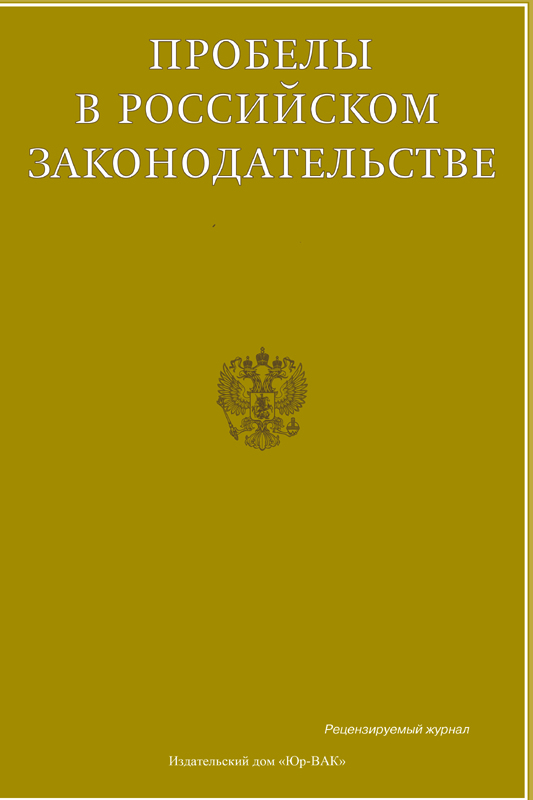Problems of Formation of Judicial Legal Positions in Criminal Proceedings
- Authors: Berova J.M.1, Gelyakhova L.A.1
-
Affiliations:
- North Caucasus Institute for Advanced Studies (branch) of the Krasnodar University of the Ministry of Internal Affairs of Russia
- Issue: Vol 15, No 6 (2022)
- Pages: 182-186
- Section: Articles
- URL: https://journals.eco-vector.com/2072-3164/article/view/531638
- ID: 531638
Cite item
Abstract
Judicial legal positions in criminal proceedings have repeatedly been the subject of scientific research in the doctrine, theoretical and practical aspects and forms of their implementation in the process of law enforcement have been analyzed. In the theory of criminal law, judicial legal positions are traditionally considered as the conclusions of the court regarding the problem under consideration, based on an objective comprehensive study of the materials of the criminal case, expressed in the final decision of the court of general jurisdiction. This article notes that the formation of judicial legal positions in criminal proceedings is significantly influenced by the legal positions of the highest judicial authorities, including international courts, as well as the rule of prejudice and the internal discretion of the judge. The article provides arguments justifying the need to consolidate the right of the court when forming a legal position on a specific criminal case not to take into account prejudicial facts, but to conduct an additional verification of circumstances that raise doubts about their reliability, established by a judicial act that has entered into legal force, along with other facts to be proved. The article formulates the conclusion that the formation of a judicial legal position in a particular criminal case is carried out on the basis of the law, the inner conviction of the judge, taking into account the actual circumstances of the case, using the legal positions formulated by the highest judicial instances.
Full Text
About the authors
Juliet Mikhailovna Berova
North Caucasus Institute for Advanced Studies (branch) of the Krasnodar University of the Ministry of Internal Affairs of RussiaDr.Sci.(Law), Police Colonel, Deputy Head Nalchik, Russia
Leyla Abdullahovna Gelyakhova
North Caucasus Institute for Advanced Studies (branch) of the Krasnodar University of the Ministry of Internal Affairs of Russia
Email: lel4993@mail.ru
Cand.Sci.(Law), Police Captain, Deputy Head of the Department of Law Enforcement Organization Nalchik, Russia
References
- Bondar N.S. Uniformity of Judicial Practice in the Modern Legal Order: Constitutional and Legal Mechanisms for Ensuring // Russian Justice. 2022. No. 9.
- Burmagin S.V. On the influence of the decisions of the European Court of Human Rights on the criminal proceedings in Russia // Russian Justice. 2016. No. 3.
- Vidergold A.I. Legal positions of the Supreme Court of the Russian Federation and their manifestation in criminal proceedings: theoretical and practical aspects: dis. … cand. legal Sciences. Yekaterinburg, 2017.
- Darovskikh S.M. Judicial legal positions in criminal proceedings: theoretical foundations and procedural forms: dis. … doc. legal Sciences. M., 2011.
- Devyatova O.V. Decisions of the European Court of Human Rights in the mechanism of criminal procedure regulation: author. dis. … cand. legal Sciences. Izhevsk, 2007.
- Eremin A.R., Kuzenkov K.G. Judicial practice of the Supreme Court of the Russian Federation // Gaps in Russian legislation. 2020. Vol. 13. No. 3.
- Mavrin S.P. Decisions of the European Court of Human Rights in the Legal System of Russia // Journal of Constitutional Justice. 2015. No. 6.
- Sidorenko M.V. Legal certainty as a subject of legal positions and final conclusions of the Constitutional Court of Russia // Gaps in Russian legislation. 2015. No. 5.
- Shutemova T.V. Influence of the judicial practice of the European Court of Human Rights on ensuring the rights of the victim in the criminal process of Russia // Vector of Science TSU. Ser.: Juridical sciences. 2014. No. 2 (17).
- Ebzeev B.S. The Constitutional Court of the Russian Federation: formation, legal nature, legal positions // Commentary on the decisions of the Constitutional Court of the Russian Federation. M., 2000. Vol. 1.
Supplementary files









